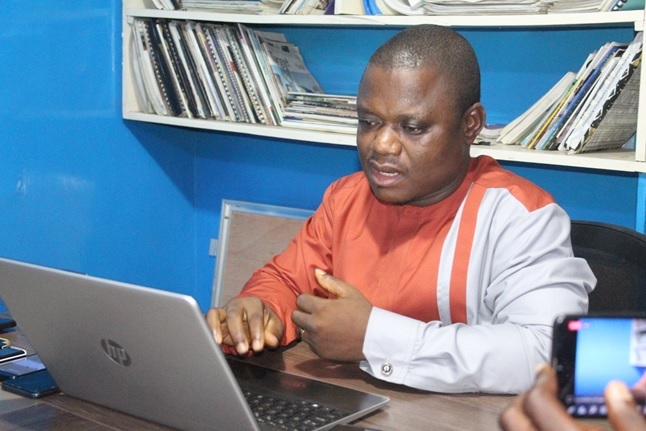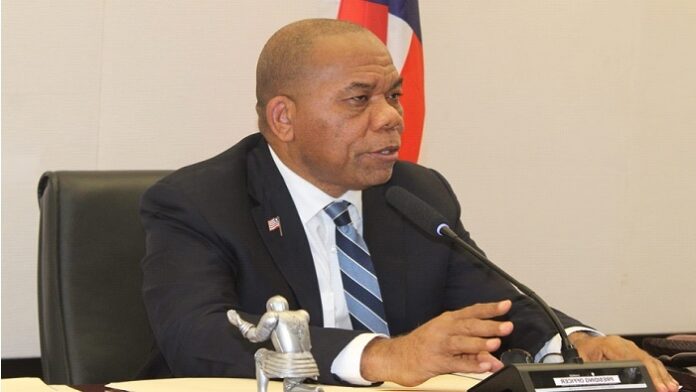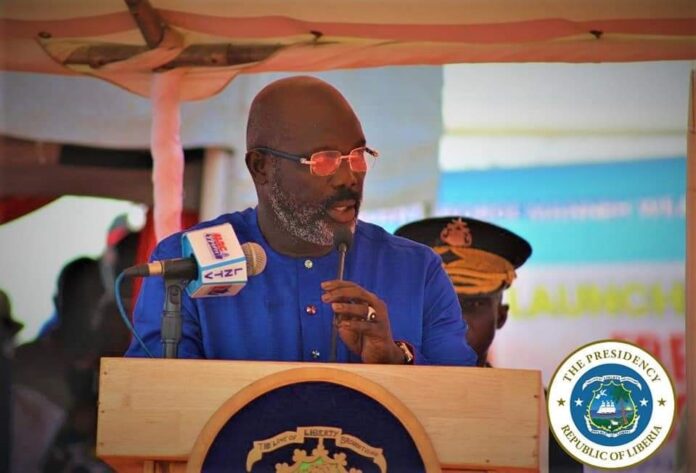LIBERIA – One of Liberia’s integrity institutions, the Center for Transparency and Accountability in Liberia (CENTAL) has disclosed that although no empirical evidence, allegations of corruption tend to shed light on the prevalence of corruption in the country.
In a recently released report “State of Corruption Report” CENTAL said since corruption usually takes place out of the public eye and accountability is hardly forthcoming, adding that the reports of corruption, in addition to many other indicators, provide an indication of how corruption is playing out.
Importantly also, the report indicated that the said allegations affect how the public perceives the level of corruption in the country.
The CENTAL report further narrated that as officials of the government of Liberia and individuals at the center of corruption scandals go unpunished — the culture of impunity continues to thrive and public perception increasingly reflects this reality.
For instance, in 2021, the report stated of the 50 cases investigated by the Liberia Anti-Corruption Commission (LACC), only 4 were submitted to the Ministry of Justice for prosecution while others resulted in the recovery of only LD$32,836,420.15 (an equivalent of US$218,909.00) with the LACC citing resource limitation as a key challenge affecting its ability to carry out investigations effectively.
The report pointed out that while the LACC has commended the government for providing it operational support beyond salaries for the first time in recent years, it still complains about the lack of adequate logistics including fuel supply and funding for investigations in other parts of the country; and if allegations of corruption must be thoroughly investigated and prosecuted, continuous and timely provision of necessary resources is critical.
Narrating further, the report said investigations into allegations of corruption have also been undercut by deliberate interference with the investigative mandate of the LACC. For example, according to the report, the President appoints investigators other than the LACC to probe allegations of corruption.
The report said a case in point is the appointment in August 2021 of the Legal Advisor to the President, Cllr. Archibald Bernard, to investigate the Coordinator of Presidential Special Projects, Madam MaKenneh Keita. Madam Keita was alleged to have solicited US$5 million in bribes from foreign investors.
After months of silence, the report said that the public was informed in March 2022 that the Liberia National Police (LNP) had conducted an investigation vindicating Keita and implicating others. The commencement of the investigation with the President’s Advisor, and subsequently the police without the involvement of the statutory agency with the mandate to investigate corruption, is just an example of how the LACC is undercut regarding its mandate.
It must be noted, however, the report indicated that while the LACC has applied efforts in investigating cases of corruption, it has shown signs of selective investigation. For instance, it has seemingly failed to investigate its own Vice Chairperson, Cllr. Kanio Bai Gbala, who faces accusations of conflict of interests. The Commission had forwarded the matter to the Ministry of Justice for investigations to avoid suspicion of partiality.
However, according to the report, the Ministry rejected the matter citing LACC’s mandate to investigate corruption. Since the case was returned to the commission in October 2021, there has been no further information provided by the LACC concerning the outcome of the investigation. Meanwhile, during the period under review, the LACC and other integrity institutions investigated some allegations of corruption.
Liberia Anti-Corruption Commission Investigations
The report explained on December 2, 2021, following her investigation by the LACC for a conflict of interest involving a contract awarded to a company owned by her brothers, the Chairperson of the National Elections Commission (NEC), Davidetta Browne Lansanah, was indicted and forwarded to court, accordingly, the NEC had spent US$182,320 to rent 20 facial recognition thermometers that cost no more than US$1,500 apiece on purchase.
However, the case was dismissed by Criminal Court “C” on grounds that the Office of the Ombudsman is the appropriate forum with original jurisdiction over violations of the Code of Conduct for Public Officials.14 Since the Office of the Ombudsman is yet to be established, the alleged violation of the Code by the NEC boss as well as subsequent violations would most likely happen with impunity, the report points out.
Also, in June 2022, the report disclosed that the LACC found that the Minister of Agriculture, Jeanine Cooper, awarded a US$180,000 contract to Fabrar Liberia, Inc., a company in which she is a beneficial owner.
CENTAL said that the LACC further revealed that several officials at the Liberia Institute for Statistics and GeoInformation Services (LISGIS), including Prof. Francis F. Wreh, Wilmot Smith, Lawrence George, and Dominic Paye hired the services of Avianet and Bluku Services Limited for transportation of 21,000 pieces of tablets and power banks to Liberia without adhering to the procurement process.
The officials were also found to have used funds intended for the census to pay themselves additional remuneration. At the Liberia Water & Sewer Corporation (LWSC), the LACC established that its Deputy Managing Director, Mr. Moseray Momoh, conspired with Sesay Brothers Business Center Inc. in the selling of assets (seven vehicles) of the GOL/LWSC as scraps for an amount of US$6,000.00. The LACC then submitted the concerned officials to the Ministry of Justice for prosecution. The prosecution is yet to commence and no administrative action has been taken against those implicated.
Financial Intelligence Unit Investigations
The Financial Intelligence Unit (FIU) made notable strides in tackling money laundering during the period under review. Based on a complaint received in November 2021, FIU launched an investigation into allegations of wire fraud and money laundering by Korlane Investments Liberia Limited Liability Company.
By January 2022, the FIU designated Korlane as a high-risk shell company laundering the proceeds of crimes generated through fraud, a predicated offense for money laundering. It found that Korlane, which has no known office space or employees in Liberia, acquired funds through card fraud from owners in Ecuador and Slovakia and laundered the said funds to its Liberian accounts.
The FIU, therefore, admonished all institutions to disengage and or prohibit business relationships with the company. Korlane and its owners including Patrick Hermann Diega Wahi and Evgene Nikisuit were soon indicted by the Grand Jury for Montserrado County for the crimes of Money Laundering, Wire fraud, Theft of Property, and Criminal Conspiracy. By July 2022, although the defendants were absent from court, Criminal Court ‘C’ ordered over US$234,000 confiscated from Korlane’s accounts and transferred to the general revenue account of Liberia.
Also, based on a complaint of tax evasion by an unnamed company operating in Liberia, the FIU investigated and recovered US$50,000.00 from the said company and had the said amount transferred to the general revenue account of Liberia.
In February 2022, the FIU levied fines of LRD 21,000,000 against all insurance companies operating in Liberia for non-compliance, violations, and obstruction.
According to the FIU, the companies operating refused and failed to file Currency Transaction and Suspicious Transaction Reports in violation of the 2012 Financial Intelligence Unit Act. Further, on 4 May 2022, the FIU designated the OMEGA Group of Insurance Limited and its
Managing Director, Ganjay L. Ananaba, as a ‘Primary Concern for Money Laundering in Liberia’ due to their ‘lack of cooperation, high taste for non-compliance, hostile and abusiveness to regulators and wanton disregard to the rule of law’. The FIU noted that, contrary to law, the insurance company refused and failed to file the required documents, and further failed to allow the FIU to inspect and examine its books and records.
In April 2022, FIU secured a freezing order on the assets of businessman Sheik Bassirou Kante.
Kante had been arrested by US Authorities for wire fraud and was found to have in his possession a Liberian diplomatic passport although he is not a diplomat. President Weah ordered an investigation into the Kante saga. More than six months later, the investigation has not been concluded.
Dee Maxwell Saa Kemayah, Minister of Foreign Affairs, has attributed the situation to the absence of Kante from the country.29 The Kante saga placed renewed attention on corruption in passport services under the Weah administration.
It can be recalled that former Passport Director Andrew Wonploe was indicted on charges bordering on the sale of Liberian passports to non-Liberians. Although the case was dismissed by the court due to the government’s failure to proceed with the case,31 Wonploe received designations from the United States government for his involvement in ‘significant corruption’.
General Auditing Commission Reports
The General Auditing Commission (GAC) reports that annual average audits have expanded from 35 to 55 audits over the last year. The majority, if not all, of the said audits concern projects funded by donors. These reports raise issues of unauthorized transactions, lack of full disclosure in financial statements, non-remittance of withholding taxes, non-compliance with relevant laws, and weak monitoring and evaluation, amongst others.
On the other hand, however, there is a little record that compliance audits and financial statement audits of ministries, agencies, and commissions (MACs) were undertaken during the period under review. There are a few reports affecting MACs but not entirely. For instance, a follow-up audit report on the Ministry of Justice’s (MOJ) management of the prison system was released during the period under review.
It found that funds intended to feed prisoners were diverted to security operations in Gbarpolu County during the 2020 Special Senatorial Elections. This further shows that audit regarding projects and programs managed by MACs are crucial as they shed important light on how resources are managed. Nonetheless, compliance and performance audits of MACs in light of budgetary expenditures should be prioritized since they arguably receive the majority of their funding from the national budget.
In other words, audits should seek to hold officials accountable for taxpayers’ dollars and not only for funding provided by donors through projects. Under Pillar Four of its Pro-Poor Agenda for Prosperity and Development (PAPD) which focuses on Governance and Transparency, the government committed itself to conducting periodic audits of all government institutions and full implementation of recommendations to strengthen internal controls and reduce corruption. Hence, audits of all government institutions must be prioritized.
Other Reports
On 8 April 2022, the report disclosed that the Office of the Inspector General (OIG) of the Global Fund, an international health body, released a report unearthing fraudulent practices and waste of US$1.1 million in donor funding to entities, including the Ministry of Health (MoH). Expenditure of the funds, which were aimed at combatting Tuberculosis, Malaria, and HIV/AIDS, was marred by the alleged conflict of interest, procurement fraud, overcharging for services rendered, systemic fraud, and misappropriation.
Reacting to the report a few days after its release, MoH welcomed the report but did not agree with all of its contents, asserting that funds received were adequately used to combat TB, Malaria, and HIV/AIDS. “We believe in the vigorous system of check and balance the Global Fund.
And that the Grant management system in place at the Ministry of Health along with our robust Financial Management System and many years of managing grants, we can safely say it’s impossible to engage in massive corruption without being detected over a long period of time as it has been portrayed by the OIG report.” The Ministry, however, launched an investigation into the matter.







